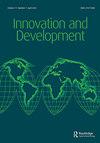New approaches to learning and regulation in medical devices and diagnostics: insights from Indian cancer care
IF 1.7
Q3 DEVELOPMENT STUDIES
引用次数: 1
Abstract
ABSTRACT This paper offers a first step to analysing sub-sector variation in firms’ learning and the types of leads or lag in industrial regulation in the Indian health industry, one of the world’s largest and broadest suppliers in critical generics, vaccines, and diagnostics. Sub-sector variation in an industry’s learning and regulation trajectory has received relatively little attention in economic development literature and has potentially important consequences for the design of the industrial policy. Our argument rests on the transfer of complexity of learning in a sub-sector to generic industrial regulations. The paper appeals to evolutionary and institutional (E-I) approaches in economics, which have made significant contributions in improving the understanding of how firms learn, and applies a qualitative heuristic focused on co-evolving institutional domains to extract some insights from the dynamics of the diagnostics and devices sector. The paper finds that although firms continue to learn and innovate, persistent regulatory challenges to firms are generated by the misapplication of industrial policies to diagnostics and devices that were intended for pharmaceuticals and vaccines. Our findings suggest sub-sector specific changes are needed on value priorities for policy design, use, and regulation of diagnostics and devices in healthcare.医疗设备和诊断中学习和监管的新方法:来自印度癌症护理的见解
本文提供了第一步,以分析公司的学习和类型领先或滞后的行业监管在印度卫生行业的子部门变化,在关键仿制药,疫苗和诊断的世界上最大和最广泛的供应商之一。在经济发展文献中,行业学习和监管轨迹中的子部门差异受到的关注相对较少,但对产业政策的设计具有潜在的重要影响。我们的论点建立在将子部门学习的复杂性转移到通用行业法规的基础上。本文采用了经济学中的进化和制度(E-I)方法,这些方法在提高对企业如何学习的理解方面做出了重大贡献,并应用了一种定性的启发式方法,专注于共同进化的制度领域,从诊断和设备行业的动态中提取一些见解。本文发现,尽管企业继续学习和创新,但由于误用了用于药品和疫苗的诊断和设备的产业政策,企业面临着持续的监管挑战。我们的研究结果表明,在医疗保健诊断和设备的政策设计、使用和监管方面,需要对具体的子行业进行价值优先级调整。
本文章由计算机程序翻译,如有差异,请以英文原文为准。
求助全文
约1分钟内获得全文
求助全文
来源期刊

Innovation and Development
Social Sciences-Cultural Studies
CiteScore
3.70
自引率
0.00%
发文量
24
期刊介绍:
conomic development and growth depend as much on social innovations as on technological advances. However, the discourse has often been confined to technological innovations in the industrial sector, with insufficient attention being paid to institutional and organisational change and to the informal sector which in some countries in the South plays a significant role. Innovation and Development is an interdisciplinary journal that adopts a broad approach to the study of innovation, in all sectors of the economy and sections of society, furthering understanding of the multidimensional process of innovation and development. It provides a forum for the discussion of issues pertaining to innovation, development and their interaction, both in the developed and developing world, with the aim of encouraging sustainable and inclusive growth. The journal encourages articles that approach the problem broadly in line with innovation system perspective focusing on the evolutionary and institutional structure of innovation and development. This focus cuts across the disciplines of Economics, Sociology, Political Science, Science and Technology Policy, Geography and Development Practice. In a section entitled Innovation in Practice, the journal includes short reports on innovative experiments with proven development impact with a view to encouraging scholars to undertake systematic inquiries on such experiments. Brief abstracts of degree awarded PhD theses in the broad area of concern for the journal and brief notes which highlight innovative ways of using internet resources and new databases or software are also published.
 求助内容:
求助内容: 应助结果提醒方式:
应助结果提醒方式:


